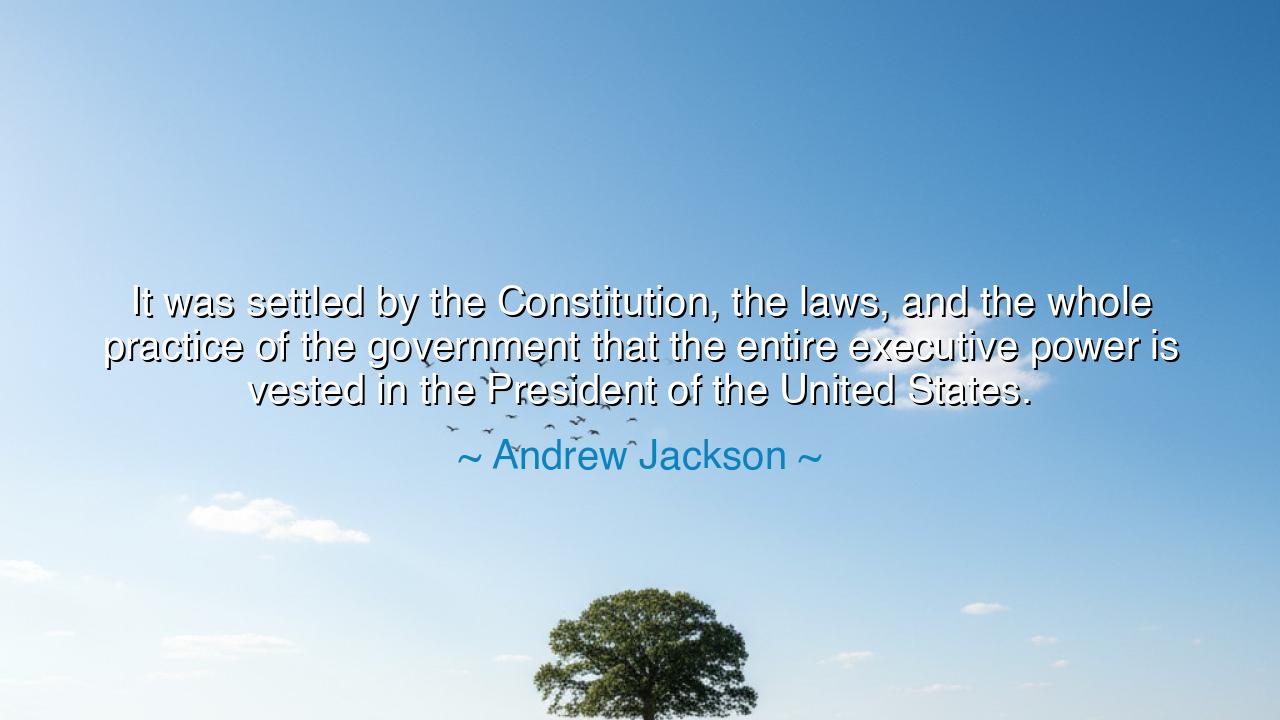
It was settled by the Constitution, the laws, and the whole
It was settled by the Constitution, the laws, and the whole practice of the government that the entire executive power is vested in the President of the United States.






"It was settled by the Constitution, the laws, and the whole practice of the government that the entire executive power is vested in the President of the United States." – Andrew Jackson
In this solemn declaration, Andrew Jackson, the seventh President of the United States, proclaims a truth that echoes through the structure of the republic: that the executive power, the strength and will to enforce the laws, resides wholly in the hands of the President. To Jackson, this was not arrogance—it was duty. He saw the presidency not as a ceremonial office or a passive instrument of Congress, but as the living embodiment of national authority and responsibility. His words assert that leadership demands unity of power; for if the executive were divided or dependent, the republic itself would falter under confusion and weakness.
The origin of this quote comes from Jackson’s struggle to define the nature of the presidency during one of the most formative periods in American government. In his time, the role of the executive branch was still uncertain. Many feared strong central authority, remembering the tyranny of kings; others recognized that without firm leadership, the Union might dissolve into factions. Jackson, a man forged in war and tempered by frontier justice, saw clearly that a government without a strong executive was a body without a heart. His interpretation of the Constitution was bold: the President, elected by the people, must command the full measure of executive power if the republic was to survive the storms of democracy.
This belief reached its fiery expression during the Bank War—Jackson’s confrontation with the Second Bank of the United States. The Bank had grown into an institution that rivaled the government’s own influence, wielding economic power that reached into every corner of the nation. Jackson viewed it as a private empire within a republic, unaccountable to the people. When Congress renewed the Bank’s charter, Jackson vetoed it, declaring that he alone, as the people’s chosen executive, must guard their interests. His enemies called him a tyrant; his supporters called him a defender of liberty. But Jackson’s stance made one principle clear: the executive branch was not subordinate, but equal in power to the legislative, and fully responsible for enforcing the will of the nation’s laws.
In a broader sense, Jackson’s statement speaks to a universal truth of governance. Power, to be effective, must be concentrated in responsibility. A nation cannot move forward if every decision is diluted through endless committees and divided loyalties. The ancients knew this well: Rome’s Consuls, though balanced by the Senate, wielded absolute authority in command because the safety of the Republic demanded swift action. So too did George Washington, when he held together the fragile new nation through integrity and strength of will. Jackson followed in this tradition, believing that only a President empowered to act decisively could safeguard the liberties of the people.
Yet Jackson’s vision carries a warning as well. For though the executive power must be whole, it must never be absolute. The Constitution vests authority in the President not as a master, but as a servant of the law. Jackson’s own presidency, marked by fierce independence, often teetered on the edge of authoritarianism. His defiance of the Supreme Court in the Cherokee cases and his forceful use of the veto alarmed many who feared that liberty could be endangered by the very strength that protected it. Thus, his legacy is a double-edged lesson: strong leadership is vital—but only when bound by moral restraint and fidelity to the Constitution.
The lesson, therefore, is timeless: authority must exist, but it must be just. The executive, like the captain of a ship, must steer with firm hands, yet always by the compass of law. In every generation, nations must decide how to balance power and freedom, strength and humility. Jackson reminds us that a leader who shrinks from duty invites chaos, but one who oversteps it invites tyranny. The health of a republic depends upon leaders who wield power as a sacred trust, not as a personal prize.
And so, the practical actions for us are these: honor leadership that is courageous yet accountable; respect authority, but never surrender conscience; demand both strength and virtue from those who govern. For as Andrew Jackson declared, the executive power belongs to the President—but its true mastery lies in the faithful service of the people and the unwavering obedience to the Constitution, the eternal guardian of liberty.






AAdministratorAdministrator
Welcome, honored guests. Please leave a comment, we will respond soon